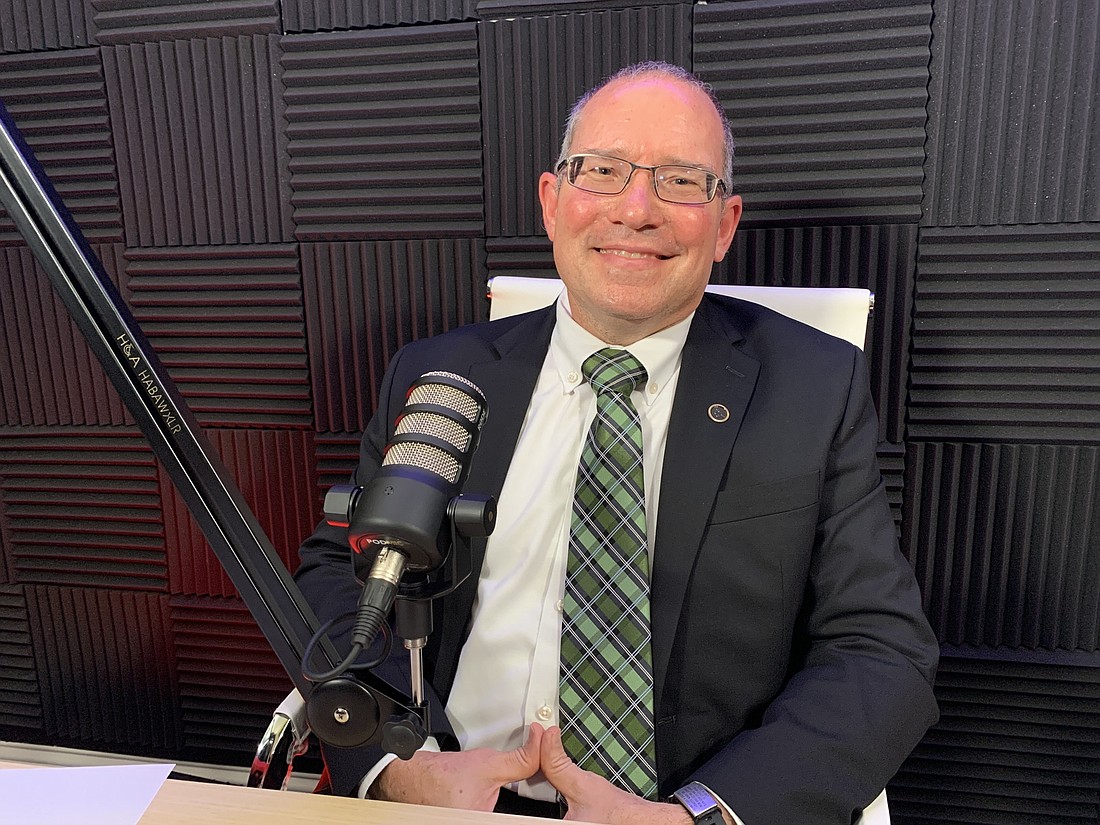- November 23, 2024
-
-
Loading

Loading

The world might get pessimistic or negative, but Peter Bugnet refuses to participate in all that. In the decade I have known him, he has always had a smile on his face. This summer, Bugnet (pronounced bun-YAY) was called to be the bishop of the Bunnell Ward of The Church of Jesus Christ of Latter-day Saints, which happens to be the church I attend. We spoke recently about leadership, service and not rolling your eyes at teenagers.
Click below for the video, or scroll down for an edited transcript.
You became bishop in June. What have you learned since then?
I’ve grown up in the church; I was baptized at 8 years old. But this is definitely a new perspective that a “regular” member wouldn’t see or have to worry about. It’s been a real blessing to be able to help in a much greater way.
You always have a smile on your face. What’s your secret?
To me, life is too short. There’s so much joy around me. I’m a scientist, and I love nature, and I love learning how things are put together, and I see it as God’s handiwork. Life is too short to get upset when someone is driving — it’s just a waste of energy.
What are some principles of leadership you try to follow?
I try to follow the example of Jesus, leading not by walking in front, "Hey look at me," but almost from the back — or at least in the midst — and say, “Hey, come with me.” I didn’t want to be a Napoleon charging out front. I want to be in the journey with them.
What principles guide your response when people come to you for help as bishop?
I’ve always felt and been taught that, ideally, everybody can be self reliant. So yes, we’re going to extend our hand to help people in need, but at the same time, it’s not a hand out, it’s a hand up. We want to help teach them how to help themselves.
Your main responsibility as bishop is with the youth. What have you learned from the teenagers you serve?
I think I’m lucky in one respect that I taught high school for 13 years in a previous life, and so I really enjoy the youth, 12-18. I love the perspective they have on things. Being a little more than 50 already, it’s hard to sometimes remember how I saw things back at that age, so it’s lovely to get that fresh take on things. They’re mature enough to understand most of how the world works. I've enjoyed that "yolo" thought — it’s refreshing. We get stuck in our ways as older people sometimes. Being able to nurture and guide them is fulfilling.
You don’t find yourself rolling your eyes at them sometimes?
I try not to! (Laughs)
Some people call us Mormons. Can you explain the church’s renewed emphasis on the full name of the church?
“Mormon” for the longest time was a nickname, because a prophet-historian from the past, Mormon, compiled a thousand years of records and compiled it into The Book of Mormon. And so, because that was one distinguishing feature of the church — of course we believe in the Bible and use the Bible daily — but it kind of was a nickname. But because we follow Jesus Christ, and we don’t worship Mormon, it’s important to distinguish what we believe.
You are a former high school science teacher and still a full-time science geek. Is that fair to say? What does science have to do with faith?
I prefer “nerd.” (Laughs)
At graduate school, I ran into this a lot — that most of the professors were not people of faith. They shunned faith. For me, I always wanted to see, “How did God do this?” Science was simply the tool that he used to create the universe.
You’re also a magician, performing as Peter the Great. What do you enjoy about entertaining people?
I love to smile, to make people laugh. Life gets so serious — there's a lot of hard stuff out there. So I like to lighten the mood and let people escape for a little bit. I don’t like to just trick them; that’s not my way. Some mystery in life is good.
Considering you have so much experience teaching and performing, you don’t actually deliver many sermons at church. What do you think members of the congregation gain from preparing their own sermons for the worship services?
It’s a lay clergy. I believe fully that if you’re able to teach something that you learn so much more yourself. For example, we will have a topic that we think everybody needs to think about — I have two counselors — and we think about who maybe has some experience with that, but also who in the congregation could benefit from diving into that a little bit more and sharing it.
Church membership in general is declining in America, as is the number of people who are affiliated with any particular church. What good does church membership do for a community?
Having a faith-filled life is really beneficial because it lets you get outside yourself. When we’re self-centered, only focused on our own things, we tend to get bitter, get negative. So, recognizing that there is a higher power beyond ourselves helps us to be more loving and to want to serve more. And by serving others, it helps us more than it helps them, often. A lot of people, some people, are able to live a moral life, even with an atheistic approach, and that’s wonderful, but I think a lot of us need a little bit more — the commandments — to help us to stay on the straight and narrow. I’ve been blessed to avoid so many possible problems because I had that background, and I know what’s right.